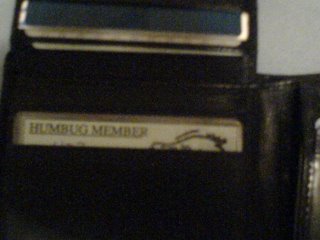Unix User Group = A Unique Microcosm
Intro
After having a work colleague in my ear all the time about going along to the Unix user group that he attends, I finally decided to not only have a look, but to also join the group. Twenty bucks and a form later, I am now a card-carrying member of HUMBUG - Home Unix Machine Brisbane Users Group. Card-carrying proof:

The main reasons for joining are to network with other Unix professionals, advocate Ubuntu, help out new and potential Ubuntu users and, most importantly, I joined up for the chicks.
The First Hour
Being the first time I have ever stepped into a classroom at UQ, I made a mistake of just remembering the number of the room. I had the right building and the right floor, but there were multiple 201 rooms.. The lettering scheme didn't quite seem to make sense either.
When I rocked up to the correct room, there were two guys sitting well apart from each other both seeming quite happy to sit there in silence. The room lacked any insignia

and even the multiple switches that were strategically placed around the large room seemed to blend into the decor. "Is this Humbug?" I asked one of the gentlemen, then after receiving an affirmative answer, I just started rambling on about how I work with the guy who usually comes to these meetings, etc, etc. The group secretary stops me from continuing by saying that the other guy is new and doesn't seem to care who I know..
After handing over the money and forms, I get to business on starting to log some more Ubuntu bugs. During the setup, I get started on configuring my machine to pick up the dhcp and have no luck with a half-assed attempt at trying to connect to the WLAN that was available. I wouldn't mind writing some doco for members on how to get the right settings for all the available services, perhaps a wiki if it fits in with the ideologies of the group. I lurve doco.
During working on the laptop a few discussions have started off very quickly and everyone has a general good amount of respect for each other with some interesting points being raised. During the first hour, a chap from Kingaroy had arrived to chat about Linux and get some general help. Kingaroy, although it sounds like an awesome name for a multinational conglomerate, is a small country town that is 3 hours drive from Brisbane. Kingaroy even has it's own LUG (Linux User Group).. It was very interesting to see how far somebody would come to get to the meeting.
The Centre-Of-Attention Discussion
About two and a half hours into the meeting, I was running from computer to computer helping out two different guys with their Debian systems, trying to get one guy's EPSON printer working through CUPS and another guy's apt-get services working through the proxy at the meeting.
On Saturday night I had plans to go out and have a few beers with some mates, so I had to cut the night short, real short.. My problem was that I was loving the whole "oh do you use a Unix-based OS? get out of town, so do I" environment so much that I would easily be speaking to somebody, then mid-sentence I would start helping somebody out with their problem, then start talking to somebody halfway through the problem. Basically, quality of work and quality of teaching had declined because I had to go elsewhere. I have learnt the lesson of only helping one person at a time, if possible. It would not have been as bad as it was if I was staying on, but I wasn't.
During my frantic bashings at a keyboard, a guy with no PC next to him was lying back nonchalantly across a few tables and proclaimed that he does not think that Linux has a place on the desktop market. People who work with me would know that's a really good way to fish me in for an argument. I am a very passionate proponent of replacing Windows the world over with Ubuntu both at home and in the workplace. It can be done.
What had followed was me proclaiming back at him that I completely disagree with what he had just said. My vocalness and the fact that his group of surrounding yesmen had not offered one retort left me in bad position with the status quo. I had disagreed with a little aggressive-assertiveness with a loud clear voice. It was the Good, the Bad and the Ugly - high noon. I am certain at least one of these goes down at every meeting at every UUG/LUG about something. I was also without backup as my work colleague did not attend and I was attending my first night, so nobody would have any standings on whether they believed my ramblings or not.
MindJet/Freemind
The argument was somewhat of a farce with his winning point being about the fact that if it didn't run MindJet, it would not work in the desktop market. He won because it was going nowhere and the fact that I hadn't heard of MindJet before had worked to lessen my perceived level of general IT knowledge. I asked attentatively if he could briefly outline what it was about, etc. during which it sounded like another wanky-buzzword management tool. He would be classed as a MindJet advocate.. He went on to tell me and the rest of the room of how it helps him out for his line of work which did make it sound useful.
After researching MindJet, I would have to come close to saying that it does seem to be classed as a killer app for business and it could easily be used in the home. However, during the debate, somebody had asked the other guy about Freemind, which he had stated that it was terrible with the yesmen collectively nodding their heads to. Open source apps always start off terribly, especially something as big as Freemind, that's why people collaborate and work on such projects. I am certain that Freemind would have some financial backing and it would be in line for alot more. This is a definate "watch this space" project.
So-called Linux desktop killers like MindJet and AutoCAD do not have the potential to stop the ever-increasing momentum for large-scale Linux desktop rollouts. Solutions currently exist for a central Windows server to serve out applications to Linux desktops via Citrix or the now freely-available Sun Secure Global Desktop (formely Tarantella). The rdesktop package could also provide the required access to Windows apps. In regards to AutoCAD, it has been noted that it cannot be run over Citrix, but that doesn't mean that other innovative solutions do not exist for it be shared for users in thin-client environments.
Conclusions
The opportunity to interact with the pro-Unix userland in person is a great experience and would be a great experience for users of all skill levels and interests. The flipside is that it can be likened to a real-life IRC room, with hidden hierarchies and cliques outside of the executive. I do enjoy confrontation on an academic level and I am looking forward to the next meeting. I would even like to convene a talk on why I think Linux can make it on the desktop and then hear his reasons on why he thinks it can't - instead of the ad hoc one-sided discussion that had taken place. Keep in mind that this was my first meeting, it would be unadvantageous for my cause to speak over somebody who's opinions were being followed by at least a few people and questioned by none.
Miscellanea
My flatmate had returned from her gallivantings around the South African countryside with the following gift:

and pictured on the front are..

Ubuntu Beads!!!
No, these are not Canonical-sponsored beads, they are Ubuntu beads.. The Ubuntuness gets better with the description on the back:

"The Ubuntu beads are a symbol of the spirit in which Wild Africa Cream is created. Ubuntu embraces the African tradition of goodwill and sharing between people."
It figures too - it's quite a nice drink..





0 Comments:
Post a Comment
<< Home